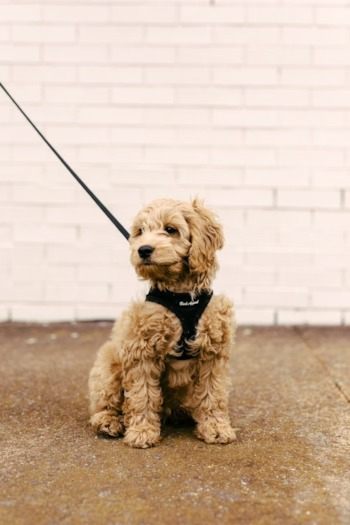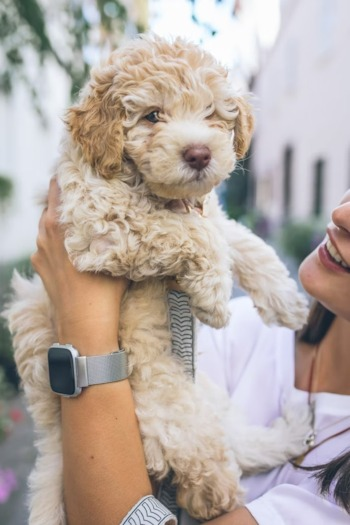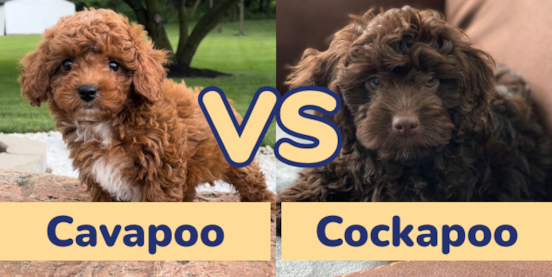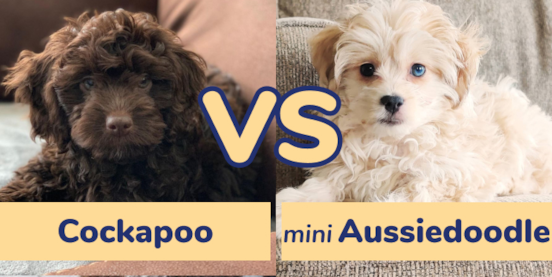Cockapoo Breed Information


The Cockapoo is a delightful and affectionate hybrid breed, resulting from the cross between a Cocker Spaniel and a Poodle. As a highly adaptable and intelligent breed, Cockapoos have quickly gained popularity among dog enthusiasts since their emergence in the 1950s. They are known for their friendly and loving temperament, making them excellent companions for families, seniors, and singles alike.
These adorable doodle dogs come in a range of sizes, mainly determined by their Poodle parent's size—Toy, Miniature, or Standard. Their coats, which can be wavy or curly, come in various colors, including black, white, cream, and apricot. Due to their Poodle lineage, Cockapoos tend to have hypoallergenic coats, making them a great choice for people with allergies.
Cockapoos are known for their sociable nature, getting along well with children, other pets, and even strangers. They are highly trainable, thanks to their intelligence and eagerness to please, making them suitable for various roles, from therapy dogs to agility competitors. However, their energy levels and exercise needs can vary, so it's essential to provide them with regular physical activity and mental stimulation to keep them happy and healthy.
Characteristics
- Affectionate and friendly: Cockapoos are renowned for their warm and loving nature. They form strong bonds with their families and enjoy cuddling, making them excellent companions for people of all ages.
- Intelligent and trainable: Thanks to their Cocker Spaniel and Poodle parentage, Cockapoos are highly intelligent dogs. They're eager to learn and respond well to positive reinforcement, making them a joy to train for various activities, from basic obedience to advanced skills.
- Adaptable and versatile: Cockapoos can thrive in various living environments, whether it's a city apartment or a sprawling country home. As long as they receive adequate exercise and mental stimulation, they're content in most settings.
- Low shedding and hypoallergenic: Owing to their Poodle genetics, Cockapoos have a low-shedding coat, which can be a significant advantage for people with allergies. While no dog is completely hypoallergenic, Cockapoos are among the breeds that produce fewer allergens.
- Social and good with children: Cockapoos are highly social animals and generally get along well with other pets and children. Their gentle and patient demeanor makes them suitable playmates for kids, provided that interactions are supervised, and children are taught how to interact with dogs respectfully.
- Moderate exercise needs: While Cockapoos are not as high-energy as some other breeds, they still require regular exercise to stay physically and mentally healthy. A combination of walks, playtime, and mental stimulation through puzzles and training will keep your Cockapoo happy and well-behaved.

Appearance
The Cockapoo's appearance is a delightful combination of the Cocker Spaniel and Poodle breeds, resulting in a charming and lovable dog that can vary somewhat in size, coat type, and color.
Size: Cockapoos come in three primary sizes, determined by the Poodle parent's size: Toy, Miniature, and Standard. Toy Cockapoos typically weigh between 6 to 12 pounds and stand around 10 inches tall at the shoulder. Miniature Cockapoos weigh between 13 to 18 pounds and stand approximately 11 to 14 inches tall, while Standard Cockapoos can weigh anywhere from 19 to 30 pounds and stand 15 inches or taller.
Coat: Cockapoos have a unique coat that can range from wavy to curly, with a soft and dense texture. Their coat is typically low-shedding and hypoallergenic, thanks to their Poodle lineage. This makes them a popular choice for allergy sufferers, although it's important to remember that no dog is completely hypoallergenic.
Color: The Cockapoo's coat can come in a wide variety of colors, including black, white, cream, apricot, red, silver, chocolate, or a combination of these colors in various patterns such as parti, phantom, or merle. The exact coat color of a Cockapoo can sometimes be difficult to predict and may change slightly as the dog matures.
Face and body: Cockapoos often have a friendly, expressive face with round or almond-shaped eyes that convey their loving and intelligent nature. Their ears are medium to long and hang down, resembling the Cocker Spaniel parent. The body is usually well-proportioned, with a sturdy build and strong, agile legs that allow them to be quite athletic.
Since Cockapoos are a hybrid breed, their appearance can vary depending on the traits inherited from their parent breeds. However, this variability also contributes to the breed's charm and uniqueness, with each Cockapoo having its own distinct look and personality.
Photos
Temperament
The Cockapoo is celebrated for its wonderful temperament, which is often described as affectionate, friendly, and sociable. These dogs are known to form deep bonds with their human families, showing loyalty and love throughout their lives. Their cheerful and outgoing nature makes them great companions for people of all ages, from young children to the elderly.
One of the key traits of the Cockapoo's temperament is their high level of intelligence, inherited from both their Cocker Spaniel and Poodle parents. This intelligence, combined with their eager-to-please attitude, makes them highly trainable and responsive to positive reinforcement techniques. They are quick learners and enjoy engaging in various activities, such as obedience training, agility, and even dog sports.
Cockapoos are generally good-natured and get along well with other pets, including cats and other dogs, as long as they are properly socialized from a young age. Early socialization helps ensure that they develop a well-rounded and balanced temperament, allowing them to feel comfortable and confident in different situations and environments.
While Cockapoos are typically friendly and welcoming towards strangers, some may exhibit a more reserved nature. It is essential to expose them to various people and experiences early on to foster a confident and easy-going temperament.
It's worth noting that the Cockapoo's temperament can be influenced by factors such as genetics, upbringing, and socialization. As a result, it is essential to work closely with reputable breeders who prioritize temperament and to invest time in proper training and socialization to help your Cockapoo develop into a well-mannered and delightful companion.
Insights

Cavapoo vs Cockapoo Comparison
When seeking the ideal canine companion, the vast array of dog breeds available can often seem overwhelming. Among the popular choices for families and individuals alike are designer breeds, specifically the Cavapoo and Cockapoo. Both stemming from part Poodle lineage, these hybrids have soared in popularity due to their charismatic personalities and hypoallergenic coats.
Yet, while they may share the Poodle parentage and certain traits, the Cavapoo and Cockapoo each possess unique...

Cockapoo. vs Mini Aussiedoodle Comparison
When it comes to selecting the ideal canine companion, the vast world of dog breeds offers a plethora of choices. Two breeds that have gained significant popularity in recent years are the charming Cockapoo and the vibrant Mini Aussiedoodle. Both breeds come from a lineage of intelligence and charm, combining the best of their parent breeds in a delightful mix. However, potential dog owners often find themselves in a conundrum, trying to decipher which of these curly-coated cuties might be the...
Care
Grooming
Grooming is an essential aspect of Cockapoo care, as their unique coats require regular attention to keep them looking and feeling their best. Here are some key grooming tips to help maintain your Cockapoo's coat and overall appearance:
- Brushing: Regular brushing is crucial for Cockapoos to prevent matting and tangles in their wavy or curly coats. Aim to brush your Cockapoo at least two to three times a week, using a slicker brush or pin brush to gently work through any knots. For particularly stubborn tangles, you can use a comb or dematting tool with care.
- Bathing: Cockapoos generally need a bath every four to six weeks, depending on their level of activity and the condition of their coat. Use a gentle, dog-specific shampoo to clean their fur, taking care to rinse thoroughly to avoid any residue that could cause skin irritation. Always towel dry or use a low-heat hairdryer, making sure not to overheat your dog's skin.
- Trimming: Depending on the length and thickness of your Cockapoo's coat, you may need to trim it every six to eight weeks to keep it manageable and neat. You can either learn to trim your dog's coat at home or take them to a professional groomer. Regular trimming can help prevent matting, maintain a consistent appearance, and keep your dog comfortable, especially during warmer months.
- Ear care: Due to their floppy ears, Cockapoos can be prone to ear infections. Make sure to check and clean their ears weekly, using a veterinarian-recommended ear cleaning solution and a cotton ball or soft cloth. Be cautious not to insert anything into the ear canal, as this can cause damage.
- Nail trimming: Regular nail trimming is essential for your Cockapoo's comfort and overall health. Aim to trim their nails every three to four weeks, using a dog nail clipper or grinder. If you're unsure about how to trim your dog's nails safely, consult your veterinarian or a professional groomer for guidance.
- Dental care: Maintaining your Cockapoo's dental health is crucial to prevent dental issues such as bad breath, gum disease, and tooth loss. Brush their teeth at least two to three times a week using a dog-specific toothpaste and a soft-bristled toothbrush. Regular dental check-ups with your veterinarian are also essential.
By following these grooming guidelines, you can help ensure that your Cockapoo stays healthy, comfortable, and looking their best at all times. Regular grooming also provides an opportunity to bond with your dog and to check for any signs of skin issues, parasites, or other potential health concerns.
Exercise Needs
Cockapoos, like any other dog breed, have exercise needs that must be met to ensure their overall health and happiness. Although they are not considered a high-energy breed, Cockapoos still require regular physical activity to maintain their weight, prevent boredom, and expend their energy in a positive way. Here are some guidelines for meeting your Cockapoo's exercise needs:
Daily walks: Cockapoos generally benefit from at least one or two daily walks, depending on their age, size, and energy levels. A 20 to 30-minute walk is usually sufficient for most Cockapoos, but some may require more or less depending on their individual needs. Regular walks not only provide physical exercise but also offer mental stimulation and socialization opportunities.
Playtime: Engaging in interactive play sessions with your Cockapoo is a fun way to keep them active and happy. Fetch, tug-of-war, and hide-and-seek are all great games that can help strengthen the bond between you and your dog while providing them with exercise. Make sure to use dog-safe toys and to supervise playtime to ensure safety.
Dog sports and activities: Cockapoos are intelligent and eager to learn, making them well-suited for various dog sports and activities such as agility, flyball, or obedience training. Participating in these activities can provide both physical and mental stimulation for your Cockapoo, as well as an opportunity to socialize with other dogs and their owners.
Mental stimulation: In addition to physical exercise, it's essential to provide your Cockapoo with mental stimulation to keep their mind sharp and prevent boredom. Puzzle toys, treat-dispensing toys, and training sessions can all offer valuable mental challenges for your dog.
Off-leash exercise: If your Cockapoo has a reliable recall and behaves well off-leash, consider providing them with opportunities to run and play in a securely fenced area or a designated off-leash dog park. This allows your dog to expend energy, socialize with other dogs, and explore their environment at their own pace.
Adjusting for age and health: Keep in mind that your Cockapoo's exercise needs may change over time due to factors such as age, health, and overall fitness levels. Puppies and senior dogs may have different exercise requirements, and dogs with health issues may need modifications to their exercise routines. Always consult your veterinarian for guidance on your dog's specific needs.
Health
Cockapoos are generally healthy dogs, known for their longevity and vitality. However, like any breed, they can be predisposed to certain health issues, either inherited from their Cocker Spaniel or Poodle parentage or common to all dogs. Being aware of potential health concerns can help you take proactive steps to maintain your Cockapoo's overall well-being.
- Eye issues: Cockapoos can be prone to eye problems such as progressive retinal atrophy (PRA), cataracts, and glaucoma. Regular eye exams and screening tests can help identify these issues early, allowing for timely treatment and management.
- Ear infections: Due to their floppy ears, Cockapoos can be more susceptible to ear infections. Regular ear cleaning and monitoring for signs of infection, such as redness, swelling, or discharge, can help prevent and treat ear issues.
- Allergies: Some Cockapoos may suffer from allergies, either environmental or food-related. Symptoms can include itching, skin irritations, and gastrointestinal issues. If you suspect your dog has allergies, consult your veterinarian for guidance on diagnosis and treatment.
- Weight management: Cockapoos can be prone to weight gain if not provided with adequate exercise and a balanced diet. Ensuring your dog receives appropriate daily exercise and monitoring their food intake can help prevent obesity and related health issues.
Lifespan
Cockapoos are known for their relatively long lifespan compared to some other breeds, thanks to their hybrid vigor and the general health of their Cocker Spaniel and Poodle parent breeds. On average, a healthy Cockapoo can live between 12 to 15 years, although some individuals may live even longer, reaching up to 18 years or more with proper care.
Several factors can influence a Cockapoo's lifespan, including genetics, overall health, diet, exercise, and access to appropriate veterinary care. To help your Cockapoo enjoy a long and healthy life, consider the following:
- Regular veterinary check-ups: Consistent veterinary care, including vaccinations, parasite prevention, and dental check-ups, will help identify and address potential health issues early, contributing to a longer and healthier life.
- Balanced diet: Feeding your Cockapoo a high-quality, well-balanced diet appropriate for their age, size, and activity level will support their overall health and longevity.
- Exercise and mental stimulation: Providing regular physical activity and mental stimulation will help keep your Cockapoo at a healthy weight, reduce boredom, and promote overall well-being.
Preventive care: Monitoring your Cockapoo for signs of illness or discomfort and addressing any concerns promptly can help prevent minor issues from becoming severe, impacting their lifespan. - Socialization and training: Early socialization and proper training can help your Cockapoo develop into a well-adjusted, well-behaved pet, reducing the risk of behavioral issues that can contribute to stress or negatively impact their quality of life.
- Genetic screening: Choosing a reputable breeder who conducts health screenings on their breeding dogs can minimize the risk of inheriting genetic health issues, which could potentially impact your Cockapoo's lifespan.
Training
Cockapoos are intelligent, eager-to-please dogs, which makes them highly trainable and well-suited to various types of training. Their Cocker Spaniel and Poodle parentage provide them with a natural aptitude for learning new skills and commands. To make the most of your Cockapoo's training potential, consider the following tips and guidelines:
Start early: Begin training your Cockapoo as early as possible, ideally when they are a puppy. This early start helps establish good habits and sets the foundation for a well-behaved adult dog. However, it's never too late to start training, as Cockapoos are adaptable and can learn new skills at any age.
Use positive reinforcement: Cockapoos respond best to positive reinforcement training methods, which involve rewarding desired behaviors with treats, praise, or play. This approach helps strengthen the bond between you and your dog while promoting a positive learning environment.
Be consistent: Consistency is key when training your Cockapoo. Ensure that all family members use the same commands and follow the same training techniques to avoid confusion and reinforce desired behaviors effectively.
Socialization: Socialization is a vital aspect of your Cockapoo's training, as it helps them become well-adjusted and confident in various environments and situations. Expose your Cockapoo to different people, animals, sights, sounds, and experiences from a young age to promote a balanced and adaptable temperament.
Keep sessions short and engaging: Training sessions should be kept short and sweet, typically lasting around 10 to 15 minutes, to maintain your Cockapoo's interest and enthusiasm. Break up training sessions with playtime or other activities to prevent boredom and burnout.
Practice patience: Remember that training takes time, and progress may not always be linear. Be patient with your Cockapoo and celebrate small victories along the way. If you encounter difficulties or setbacks, consider seeking guidance from a professional dog trainer or enrolling your dog in a group training class.
History
The Cockapoo, a charming and endearing hybrid breed, can trace its roots back to the 1950s in the United States. Although the breed's exact origin is not well-documented, it is widely believed that the Cockapoo was one of the first intentional "designer dog" crosses, created by breeding a Cocker Spaniel with a Poodle. The goal was to combine the best traits of both parent breeds, such as the Poodle's hypoallergenic coat and the Cocker Spaniel's friendly demeanor.
In the early years, Cockapoos were primarily bred for their companionship qualities, quickly gaining popularity among families and pet owners who appreciated their affectionate and gentle nature. As their popularity grew, breeders began to focus on refining the breed's characteristics and appearance, aiming for greater consistency among litters.
Despite their long history, the Cockapoo is not yet recognized as an official breed by major kennel clubs like the American Kennel Club (AKC) or the United Kennel Club (UKC). However, they have gained recognition from smaller organizations such as the American Cockapoo Club (ACC) and the Cockapoo Club of America (CCA), both of which are dedicated to promoting the breed and establishing breeding standards.
Today, the Cockapoo continues to be a beloved family pet and companion, known for its intelligence, trainability, and adaptability. The breed has also found success in various roles, including therapy and service work, thanks to its empathetic and social nature.









